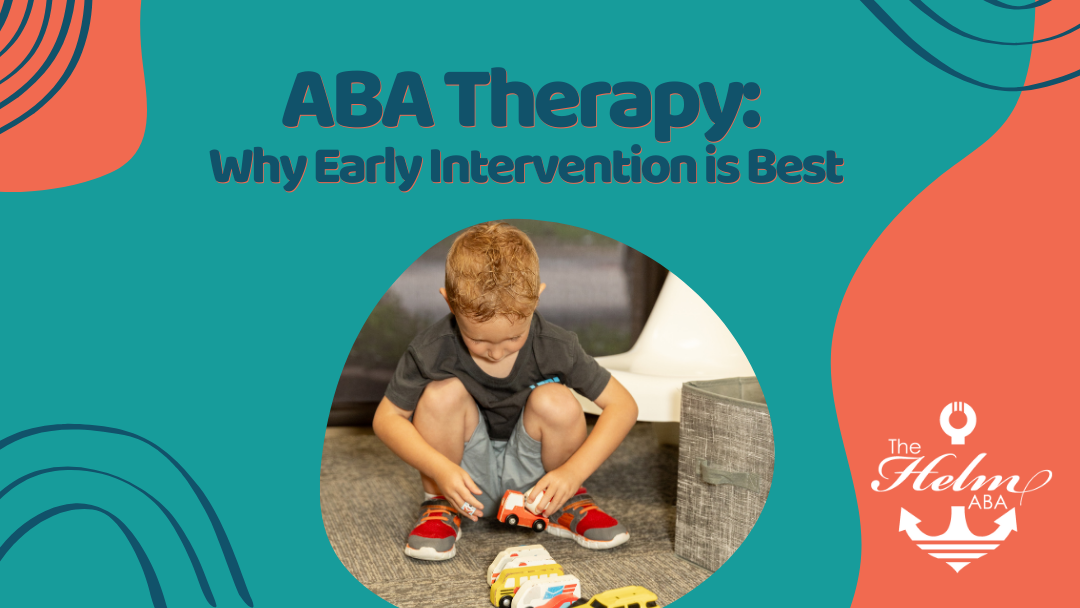ABA (Applied Behavior Analysis) therapy is one of the most well-researched and effective therapies for children with autism, helping them learn new skills and improve their quality of life. While it’s never too late to start ABA therapy, starting early has distinct advantages. Early intervention taps into a unique period of brain development and growth, which makes it an ideal time to introduce new skills and positive behaviors. Here, we’ll explore the reasons why early intervention is preferred and how it benefits children with autism.
Why Early Intervention is Key: The Science Behind Brain Development
In the early years of life, the brain undergoes rapid growth and development. During this time, the brain is highly adaptable, forming and strengthening neural connections in response to new experiences and learning. This flexibility, called “neuroplasticity,” means that children are more receptive to learning and practicing new skills in these early years.
ABA therapy takes advantage of this period of neuroplasticity, introducing skills and behaviors that may be more challenging to learn later on. By starting ABA therapy early, children with autism have the opportunity to learn essential skills, such as communication, social interaction, and daily routines, during a time when their brains are especially responsive to this kind of structured learning.
The Unique Benefits of Early ABA Therapy for Children with Autism
1. Building Communication Skills Early
Many children with autism experience difficulties in communication, which can lead to frustration and challenges in expressing their needs. ABA therapy focuses on developing communication skills in various ways, from learning to speak to using sign language or alternative communication devices. Starting ABA therapy early gives children more time to learn these critical skills and develop their own ways to communicate, reducing frustration and creating a foundation for positive interactions with others.
2. Enhancing Social and Emotional Skills
Social skills, like making eye contact, understanding body language, and participating in group activities, can be challenging for children with autism. Early intervention ABA programs are designed to teach these social skills in a supportive, step-by-step way. By beginning early, children have more time to practice these skills and gain confidence in social situations, helping them to form friendships and engage meaningfully with family and peers.
3. Encouraging Positive Behavior and Self-Regulation
Children with autism may exhibit challenging behaviors, such as tantrums, aggression, or self-injury, which can affect daily life and learning. ABA therapy uses positive reinforcement and structured techniques to address these behaviors and replace them with healthier alternatives. Early intervention allows therapists to work on these behaviors before they become ingrained, making it easier to develop positive habits that contribute to a smoother day-to-day experience for both the child and their family.
4. Developing Independence and Life Skills Early On
ABA therapy also helps children develop basic life skills, such as brushing teeth, dressing, and following daily routines. These skills are essential for independence and can be more easily learned and practiced during early childhood. By mastering these foundational skills early on, children gain a sense of independence, which can boost their confidence as they approach school age and other developmental milestones.
5. Preparing for Academic Success
For children with autism, the school environment may present various challenges. ABA therapy can help children learn academic readiness skills, such as sitting at a desk, following instructions, and focusing on tasks. These skills can be developed more naturally during early childhood, allowing children to enter school better prepared for structured learning environments. Early ABA therapy helps set children up for academic success, improving their chances of adapting to and succeeding in school.
The Long-Term Impact of Early ABA Intervention
Research shows that early intervention in ABA therapy can have a lasting positive impact. Studies reveal that children who receive ABA therapy in their early years often experience improved outcomes in language, social skills, and daily living activities compared to those who start later. Early intervention has been associated with:
– Greater independence in daily activities
– Improved academic performance
– Enhanced social interactions and relationships
– Reduced need for long-term support or intensive services
These long-term benefits underscore the importance of taking advantage of the early years when children are naturally more open to learning and adapting.
Starting Early Doesn’t Mean the Journey Ends Early
While starting ABA therapy early has its advantages, it’s important to remember that the learning process doesn’t end after early intervention. Many children will continue to benefit from ABA therapy as they grow, with programs that adjust to their changing needs and goals. Early intervention sets a strong foundation, giving children skills that they will continue to build on throughout their lives.
Conclusion: Early Intervention Offers a Strong Start
Beginning ABA therapy early takes advantage of a critical period in a child’s life, laying the groundwork for lasting improvements in communication, social skills, behavior, and independence. For children with autism, early intervention can provide them with the tools they need to navigate the world around them, helping them build a fulfilling and meaningful life.
While ABA therapy is beneficial at any age, starting early allows children to make the most of their natural learning abilities, creating a smoother path for growth and success in the years to come.

